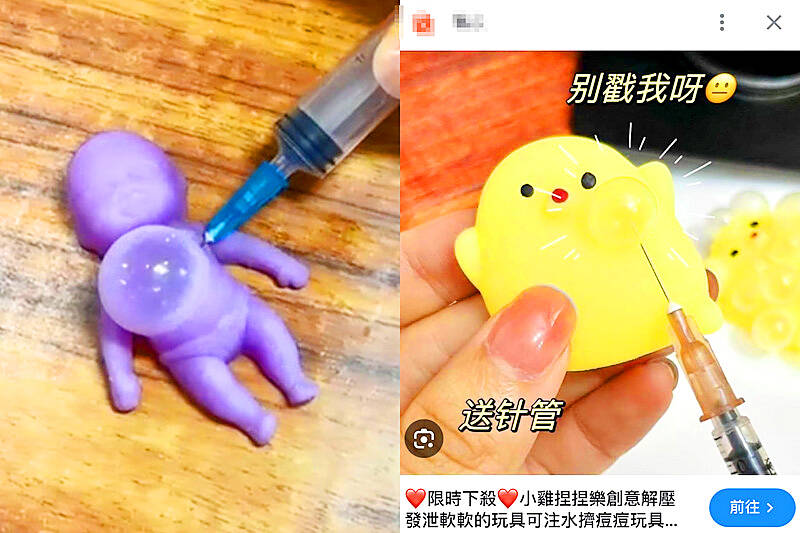The Ministry of Economic Affairs has ordered the removal of a type of Chinese toy called “acne chicken squeeze” (痘痘雞捏捏樂) from e-commerce platforms, as it contains a sharp needle that might be unsafe.
The product, touted as a “stress reliever” for children, consists of a thermoplastic rubber chicken toy with a syringe. People can use the syringe to inject air into the chicken toy, which produces acne-like air bubbles on its surface, then they can squeeze the bubbles to pop them.
However, as the toy contains a syringe with a sharp needle, it does not meet the safety standards for toys, which forbid sharp edges, ministry Bureau of Standards, Metrology and Inspection deputy head Hsieh Han-chang (謝翰璋) said, adding that the bureau has asked e-commerce platforms to remove the toys from their Web sites.

Photo: Screen grab from Sina Weibo and Taiwan Statebuilding Party member Wu Hsin-tai’s Facebook page
The bureau would continue to inspect the online platforms and physical retail locations, he said, adding that if stores fail to remove them from shelves, they could face a penalty.
The Action Alliance on Basic Education on Friday welcomed the government’s swift response to the emergence of the toy, but urged the authorities to improve examinations and management of e-commerce platforms.
Toys should be safe and serve educational and recreational purposes, but this type of dangerous toy highlights a big loophole in the toy market, and parents are very concerned, said Chung Chun-wei (鍾君偉), a representative of the alliance’s parents’ division.
Merely removing the toys from shelves is not enough, because if products that have not passed inspections can easily be sold in the market, dangerous toys would continue to appear and threaten children’s safety, added Lee Yu-han (李雨函), a representative of the alliance’s youth division.
The government must establish a stricter mechanism to examine products before they enter the domestic market, Lee said.
The government should also help parents identify products that are dangerous for children, through education and promotion, so they can avoid purchasing items from unknown sources, alliance chairman Wang Han-yang (王瀚陽) said.
Separately, in a post on his “Dr. Wubow” Facebook page, Wu Han-meng (巫漢盟), an attending physician at the Dianthus Pediatric Clinic, listed four other types of dangerous toys or items he suggested that children should not play with.
Some “slime toys” contain glues, borax, artificial fragrances and glitter, which could harm the nervous or digestive system, or cause contact dermatitis, he said.
A Chinese toy called “carrot knife” (蘿蔔刀) is a fidget tool that has a blade that people can flick out with one hand, but the blade can cut paper and might accidentally stab a classmate’s eyes or skin, causing injuries, he said.
A Chinese product called “nasal inhaler energy bar” (鼻吸能量棒) has two plastic tubes which people can insert into their nostrils and inhale the smells of camphor or peppermint, which are said to have refreshing effects, he said.
However, long-term inhalation of camphor can cause harm to the nervous system and liver, causing difficulty in breathing, nausea and vomiting, he said.
The Chinese “wax bottle candy” is made of wax in the shape of a bottle and filled with flavored syrups or jam. However, as they are sold at low prices, many people do not believe the outer layer is beeswax, but industrial wax that is not edible, Wang said.

Taiwanese can file complaints with the Tourism Administration to report travel agencies if their activities caused termination of a person’s citizenship, Mainland Affairs Council Minister Chiu Chui-cheng (邱垂正) said yesterday, after a podcaster highlighted a case in which a person’s citizenship was canceled for receiving a single-use Chinese passport to enter Russia. The council is aware of incidents in which people who signed up through Chinese travel agencies for tours of Russia were told they could obtain Russian visas and fast-track border clearance, Chiu told reporters on the sidelines of an event in Taipei. However, the travel agencies actually applied

Japanese footwear brand Onitsuka Tiger today issued a public apology and said it has suspended an employee amid allegations that the staff member discriminated against a Vietnamese customer at its Taipei 101 store. Posting on the social media platform Threads yesterday, a user said that an employee at the store said that “those shoes are very expensive” when her friend, who is a migrant worker from Vietnam, asked for assistance. The employee then ignored her until she asked again, to which she replied: "We don't have a size 37." The post had amassed nearly 26,000 likes and 916 comments as of this

New measures aimed at making Taiwan more attractive to foreign professionals came into effect this month, the National Development Council said yesterday. Among the changes, international students at Taiwanese universities would be able to work in Taiwan without a work permit in the two years after they graduate, explainer materials provided by the council said. In addition, foreign nationals who graduated from one of the world’s top 200 universities within the past five years can also apply for a two-year open work permit. Previously, those graduates would have needed to apply for a work permit using point-based criteria or have a Taiwanese company

The Shilin District Prosecutors’ Office yesterday indicted two Taiwanese and issued a wanted notice for Pete Liu (劉作虎), founder of Shenzhen-based smartphone manufacturer OnePlus Technology Co (萬普拉斯科技), for allegedly contravening the Act Governing Relations Between the People of the Taiwan Area and the Mainland Area (臺灣地區與大陸地區人民關係條例) by poaching 70 engineers in Taiwan. Liu allegedly traveled to Taiwan at the end of 2014 and met with a Taiwanese man surnamed Lin (林) to discuss establishing a mobile software research and development (R&D) team in Taiwan, prosecutors said. Without approval from the government, Lin, following Liu’s instructions, recruited more than 70 software